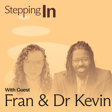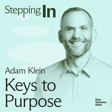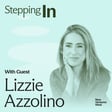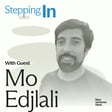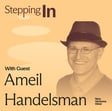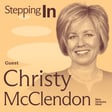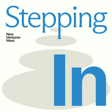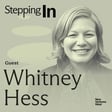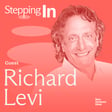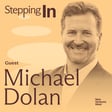
The Edges of Coaching
In this insightful episode of the Stepping In Podcast, New Ventures West managing partner Adam Klein engages in a profound dialogue with Joel Monk from Coaches Rising, exploring the evolving landscape of coaching, its shadows, and its future possibilities.
The conversation begins with both hosts sharing their personal journeys into coaching. Joel describes his transformation from a hedonistic lifestyle as a community artist and DJ to a spiritual seeker who discovered coaching through Ken Wilber's work after an existential crisis. Adam shares his parallel path, moving from engineering to founding an intentional community called Reimagine, eventually finding his way to New Ventures West through his interest in the Enneagram.
Together, they examine fundamental questions about coaching's foundations. They discuss how coaching often emphasizes success and improvement, potentially perpetuating a sense of lack in clients. Adam notes that New Ventures West's approach has evolved to be mindful of this shadow, recognizing that not everything needs to be about performance enhancement.
The conversation explores coaching's relationship with wisdom rather than success, questioning whether coaches should be provocateurs who challenge the status quo rather than simply helping clients adjust to unsustainable systems. Joel emphasizes the importance of recognizing our interconnectedness, moving beyond the hyper-individualistic approach that has dominated coaching.
A significant portion of the discussion examines AI's impact on coaching. While acknowledging AI might democratize access to coaching, both hosts agree that the human-to-human connection remains irreplaceable. They suggest AI might actually reveal what makes coaching truly powerful: the aliveness that emerges between human beings in authentic relationship.
Adam describes New Ventures West's approach as helping people "be in contact with their own aliveness," highlighting that coaching isn't merely about frameworks but about helping people connect with their unique life expression.
The hosts explore what it means for coaches to remain at their developmental edges. Joel describes the thrilling state of working at one's edge, where coaching feels alive and fresh rather than habituated. They agree that being part of a community of coaches who can offer refined feedback is essential for continued growth—something New Ventures West fosters in its cohort-based training model.
The conversation concludes with a brief mention of ethics in coaching, leaving listeners with questions about how the field might evolve while maintaining its integrity.
Throughout the dialogue, the New Ventures West philosophy shines through: an emphasis on the whole person, the importance of practice, the value of community, and a commitment to helping clients discover their unique aliveness. This conversation exemplifies the depth that New Ventures West brings to the coaching profession, inviting coaches to consider how they might continually evolve their practice.
